
The spectre of Fiji’s ‘coup culture’ continues to loom over the republic despite the peaceful transfer of power on Christmas Eve 2022. That this occurred was due, in part, to Commander Major General Ro Jone Kalouniwai’s tight reins on the military after the election.
However, in mid-January, Kalouniwai appeared to invoke the spectre of a coup with a strongly worded statement critical that the government was going too far too fast. It was uncomfortably reminiscent of former prime minister and then-Commodore Frank Bainimarama’s similar threat to Laisenia Qarase’s government in December 2006.
However, what might have developed into a significant political crisis appeared to have been reduced to a sharp but short storm in a teacup later in the day when the meeting to which Home Affairs Minister Pio Tikoduadua summoned Kalouniwai ended amicably.
Reportedly both sides ‘agreed on a new beginning’ based in a shared understanding of the appropriate relationship between the government and Republic of Fiji Military Forces.
As hopeful as many within and outside Fiji were on the day, it’s too soon to close the chapter on this incident. The spectre is embedded in the constitution—at least as the RFMF reads it.
The initial spark for the current controversy was the public statement by Attorney-General and Justice Minister Siromi Turaga that Fiji’s 2013 constitution is ‘on the table’ along with a suggestion that some necessary changes might be pursued by circumventing the constitution’s exacting amendment process.
Kalouniwai countered with his statement to remind Turaga that the RFMF had a special responsibility under section 131 of the 2013 constitution ‘to ensure that the values and principles of democracy including the checks and balances enshrined in the Constitution are not undermined’.
Despite Bainimarama’s long-repeated claim to being committed to ending Fiji’s coup culture, his former attorney-general, Aiyaz Sayed-Khaiyum, acting in his capacity as secretary of the FijiFirst party, attempted to double down on Kalouniwai’s concerns asserting that Prime Minister Sitiveni Rabuka’s tripartite coalition government was indeed undermining the constitution.
Kalouniwai’s insistence that the RFMF has an obligation to protect the ‘checks and balances’ of the constitution sits rather uneasily with the 2013 constitution’s section 98 which asserts that the Supreme Court ‘has original jurisdiction to hear and determine constitutional questions’.
So, from where does the RFMF’s assertion derive that section 131 confers some form of supra-constitutional authority to supplant the Supreme Court’s constitutional authority to determine breaches of the constitution?
A simple reading of section 131 does not explicitly place such a broad democratic duty on the RFMF. Rather it states plainly that it is the military’s overall responsibility to ‘ensure at all times the security, defence and well-being of Fiji and all Fijians.’
This is virtually a word-for-word repeat of a Rabuka-instigated provision in the flawed 1990 constitution imposed to replace the 1970 constitution which was abrogated after his 1987 coups. The provision was absent in the 1997 constitution but the presumption behind it clearly continued.
The RFMF plainly stated this interpretation in its submission to the 2013 Constitutional Commission, arguing for such a provision as the RFMF was ‘the last bastion for law and order in Fiji’.
Some argue that the importance of section 131 is not that it creates a duty to protect the constitution but that it confers a constitutionally-based social licence that gives ‘permission’ for the military to intervene in Fiji’s domestic politics when, in its judgement, the government has gone off the rails.
Regardless of how the claim is to be perceived, for more than a generation the RFMF has identified section 131 (and its constitutional antecedents) as conferring a legitimate entitlement to exercise some extra-constitutional authority at its own discretion.
Discussion during the meeting between Tikoduadua and Kalouniwai did not appear to challenge the commander’s assertion regarding the importance of section 131 as grounds for the extraordinary statement; only that it was made public. Both agreed that all the appropriate constitutional processes and boundaries in the separation of powers would be respected.
Both might have assumed, at a minimum, the other was not challenging their view of section 131.
Kalouniwai’s statement acknowledged that the new government had earned the mandate to make policy changes. And both accepted that changes should be implemented with due respect to the constitution.
Turaga came closer to challenging the view that section 131 actually could be read to confer any extra-constitutional authority in his rebuttal to Sayed-Khaiyum’s charge that the government was disrespecting constitutional boundaries. The current attorney-general told his predecessor to file a constitutional redress application through the courts.
One aspect of the 2013 constitution that troubled Tikoduadua in his meeting with Kalouniwai was in relation to his role as home affairs minister. The 1997 constitution stated explicitly that the RFMF was ‘subject to the control of the minister’ (section 112).
The 2013 constitution does not contain such a provision. This may help to explain why the Rabuka government dropped the title of defence minister from its list of portfolios but raises questions as to why the Bainimarama government felt the need to have one.
The ghost of Fiji’s coup culture cannot be vanquished easily. Even if the Supreme Court formally interpreted section 131 in the same way any democratic court would—that the constitutional role of the military is to protect the nation’s physical security—the spectre would still haunt Fiji.
If the RFMF truly wishes to end the spectre of Fiji’s coup culture, it could start by renouncing its perverse interpretation of section 131. This could facilitate the necessary and more fundamental change of culture that has persisted within the RFMF for more than a generation.

